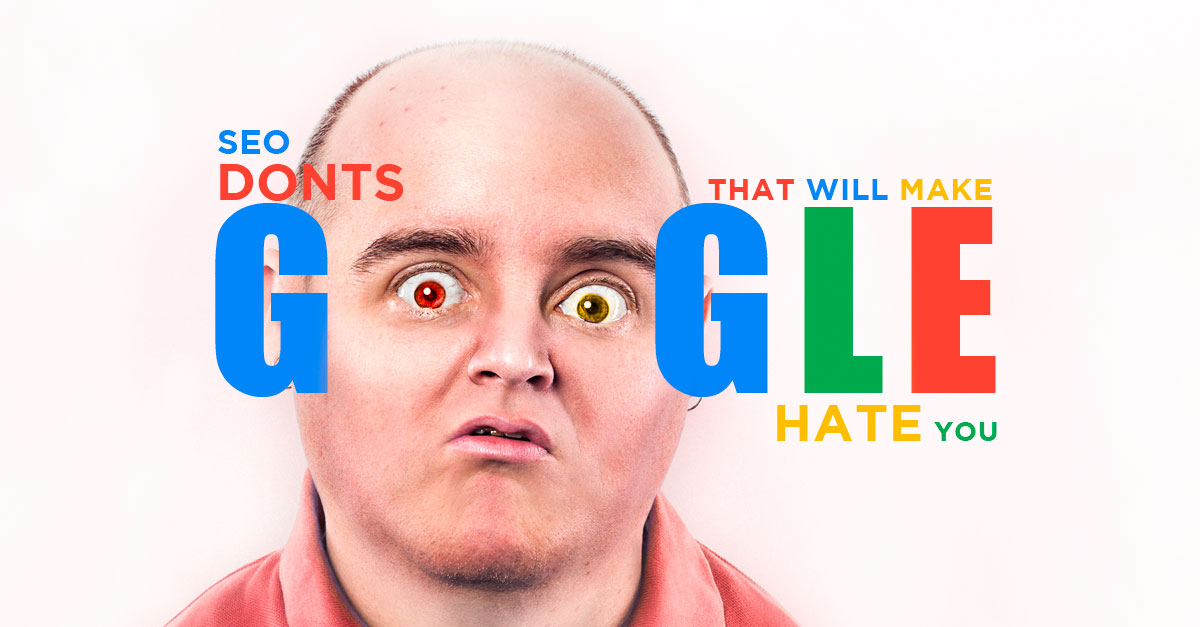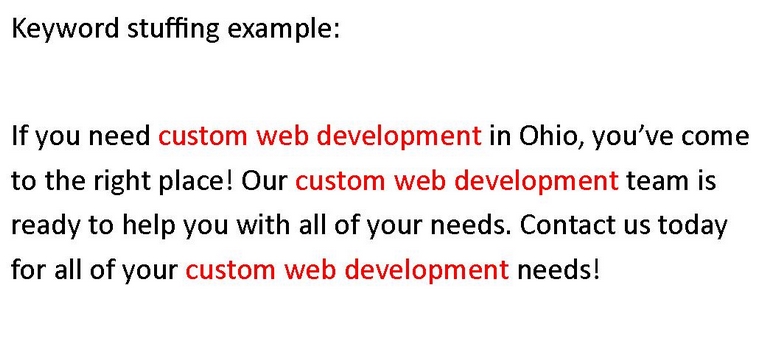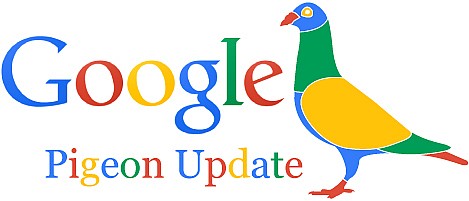SEO Don’ts – Things that will make Google Hate you

Google is known for changing its search algorithms regularly. When it does, some SEO techniques that were once considered the best are now called spammy and intentionally misleading. This forces web developers and SEO marketers to quickly change tactics, often revamping an entire SEO plan within a few days to keep a website from falling off of Google’s search results.
It can be hard to anticipate when Google will do this, but one thing you can do is know what’s currently an SEO don’t—what practices does Google hate? Knowing what Google (and most other search engines) considers black hat SEO is one way of building your website so that it avoids as many pitfalls as possible.
I’ve found some of the things that Google hates and made a list of them. These are all current as of May 2016.
Making it all about the Keywords

Adding well-researched keywords to a webpage used to be the be-all, end-all of SEO, but that’s no longer true. Today, Google has made the phrase “content is king” more relevant than ever. They actually penalize websites that make use of keyword stuffing and promote those that have helpful, natural content written for users rather than search engines.
If your content reads awkwardly or has too many repetitions of keywords, even if those repetitions aren’t intentional, you should revise it. Unfortunately, you might find that natural content doesn’t quite get you the results you want. Most SEO experts have found that creating natural content that includes a few optimized keywords is the key.
Limiting Yourself
Limiting your keywords and phrases is definitely one way of falling off Google’s radar. While it may not make the search engine actively hate you like keyword stuffing will, it’s not going to help you any. You may unintentionally limit how Google sees your website. This will result in your site appearing in fewer search results.
Limiting your keyword phrases to only a few may also makes your content repetitive, and that can lead to being penalized if Google thinks that you are keyword stuffing.
Along those same lines, once you’ve selected your keyword phrases, remember that you’re not locked into using those phrases. “Florist in Tennessee” may be a strong keyword for a florist website, but variations like “Tennessee florist” or “flowers in Tennessee” are both good ways of rephrasing that keyword to help build relevancy.
Overall, your text needs to sound natural and be informative. Locking yourself into using the same keywords throughout will not achieve either of those goals.
Misusing Anchor Text

Anchor texts used to be one of the best ways of telling Google how relevant a website was. But following the 2012 Penguin update, anchor texts became a way for Google to check a website for keyword stuffing and spamming. Now, using old-school anchor text SEO will get your website penalized and off the rankings faster than anything.
Using the same anchor text over and over for all of your backlinks is one of the easiest ways to make Google hate you. It will indicate to Google that you’re trying to rank for a specific keyword phrase by building your backlinks artificially.
Instead, you need to carefully look at the context of each link and use an anchor that is relevant to the content around it. You may not always link to a keyword phrase, but that’s okay—you always want to go with what sounds natural over what Google may see as spam or as trying to manipulate the search rankings.
Linking to Unrelated Sites
Linking to relevant sites when it fits nicely with your content and provides additional information to a user is certainly helpful. It shows Google that your site is high quality and relevant.
Linking to too many sites will show them the opposite. Too many links, especially to sites that aren’t related to your content in any way, will hurt your Google link profile.
Every time Google sees a backlink on your website, it adds it to your site’s link profile. It then analyzes your overall profile to determine what search results your site should be included in. Too many irrelevant links will create a link profile that has no focus.
Instead of being in the top search results for relevant keywords, you’ll be in the mid to bottom search results for a wide range of keywords. That might sound better, but remember, if you’re not on page one, most users aren’t even seeing your site.
Also don’t include dozens of backlinks just because they’re relevant and you can link to them. Obsessing over how many backlinks you have rather than the quality of those backlinks is a sure way of gaining penalties from Google. While having some backlinks is important to page ranking, quality is certainly more important than quantity.
Being Unoriginal

Content is king, but only if that content is original. Google will notice if your website’s copy is too similar to another’s, and it will definitely flag your site if the content is an exact duplicate of information found elsewhere. Copying and pasting information, even if it’s freely available content, should be avoided at all costs. You can use other content for research, but always put it into your own words. Doing so will create your own unique voice, too.
The same goes for reusing your own text. If you have different pages for different locations that offer similar services, make sure the text on those pages is unique. Keep your content individualized.
Remember, there’s more to good content than simply being original. If your original content is poorly written, full of grammatical errors, and unhelpful, it may not matter how many people see it. It’s not going to convert visitors to customers, and that’s the end-result SEO is after.
So in addition to creating your own original content, you need to create good content that is:
- Long enough for Google to be able to analyze it
- Have backlinks to any relevant research or authoritative sources
- Provide the reader with information or answers to questions they may have
Content is Text
You’ll definitely fail to impress Google if you always equate content with text. Today, content includes all of these things:
- Images
- Videos
- Sound bites
- Live streams
- eBooks
- Much, much more.
Having multiple types of content on your page will increase user engagement and provide more information.
However, remember that Google can’t see images or watch videos, so make certain you include tags with the relevant keywords. Again, avoid keyword stuffing here—only use what’s necessary.
Link Exchanges are Out
One way web designers used to build up their backlinks and get links to their own site was from link exchanges. Getting as many sites as possible to link to yours might sound like it would give you a boost in the rankings, but it can actually fail. Asking another website to link to yours in exchange for a reciprocal link is no longer a good idea.
Why not? For one, you may end up linking to sites outside of your niche, and I’ve already discussed how harmful that can be. For two, you may end up with links to or from low-quality pages that Google has penalized for some reason. Linking to these penalized sites can cause your own site to be considered low quality by association.
Failing to be Geographically Relevant

In 2014, Google rolled out yet another new algorithm update. This one, called pigeon, works along with panda and penguin but is fundamentally different. Penguin punished sites for spamming and panda targeted website with duplicate or very low quality content. Pigeon is more about rewarding pages, specifically pages that are geographically relevant. If you haven’t optimized your site for local searches, pigeon won’t help you at all.
But as with all of Google’s algorithm updates, some SEO best practices have changed. Pigeon wants to focus more on neighborhoods, not on states or cities. Pigeon looks at the physical distance between the user and local businesses.
It has actually shrunk the radius down to the neighborhood level rather than the city level. This means you have to be even more precise on your location or Google may ignore your pages in search results.
Be sure you research your area, too. Some neighborhoods have several names, so be certain that you do mention all of these neighborhood names somewhere.